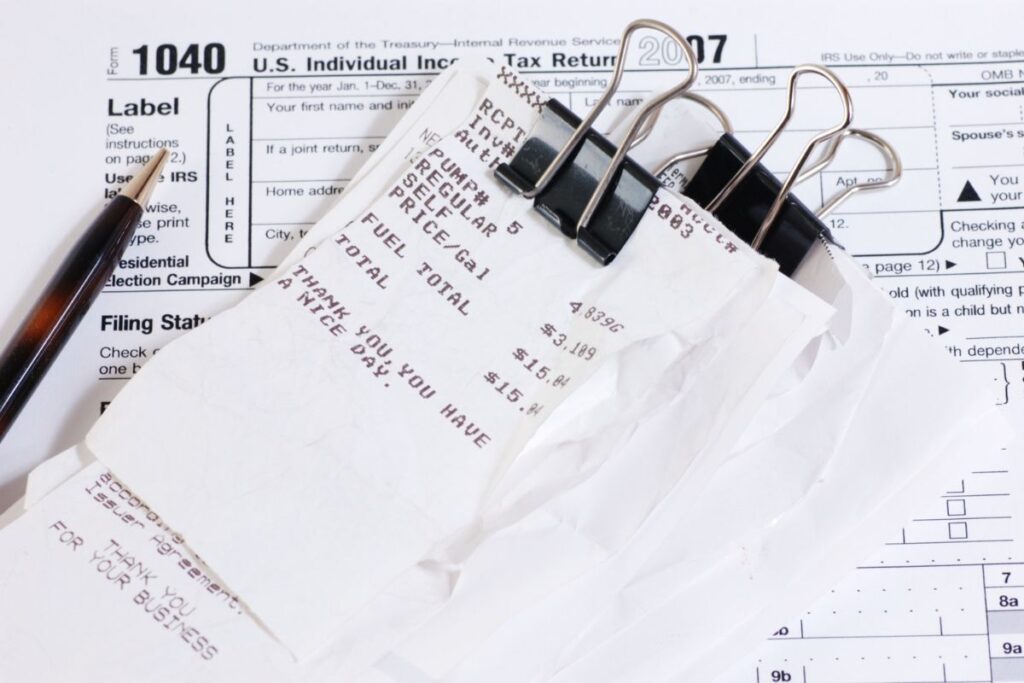
Many taxpayers are familiar with the common deductions that can be taken on their income taxes, including charitable donations or deductions for mortgage interest. However, there are a number of unusual tax deductions you may not have heard of that could save you money when filing your taxes. Let’s take a look at some of these lesser-known deductions and how they could benefit you when it comes time to file.
Contents
- 23 Unusual & Overlooked Tax Deductions
- 1. Home Office Deduction
- 2. Relocation Expenses
- 3. Job Expenses
- 4. Health Insurance Premiums Paid by Self-Employed Individuals
- 5. Pet Care Expenses
- 6. Gambling Losses
- 7. Energy-Efficient Upgrades
- 8. State Sales Taxes
- 9. State Income Tax
- 10. Tax Preparation Fees
- 11. Reinvested Dividends
- 12. Refinancing Mortgage Points
- 14. Jury Duty Pay
- 15. Charitable Contributions
- 16. American Opportunity Credit
- 17. Student Loan Interest
- 18. Child and Dependent Care
- 19. Spousal IRA Deduction
- 20. Medical and Dental Expenses
- 21. Earned Income Tax Credit
- 22. Rental Expenses
- 23. Mileage Expenses
- Conclusion
23 Unusual & Overlooked Tax Deductions
There are a number of unusual and overlooked tax deductions that can save you money when filing your taxes. This blog post will explore 23 such deductions, so read on to learn more.

1. Home Office Deduction
If you work from home, you may be able to deduct part of your rent or mortgage payments, utilities, insurance premiums, and other related expenses. The expense must be used exclusively for business purposes, however, so if you also use it as a personal space then it won’t qualify. The deduction is based on the percentage of your home used for business-related activities.
2. Relocation Expenses
One unusual tax deduction is the ability to deduct expenses related to relocating for a job. The IRS allows taxpayers to deduct certain moving expenses if they meet certain criteria, such as having moved more than 50 miles away from their previous home and has worked full-time in the new location for at least 39 weeks out of the first 12 months after the move. The deduction covers items like transportation costs, storage fees, and lodging costs associated with the move.
3. Job Expenses
If you’re someone who has unreimbursed job-related expenses—such as supplies, uniforms, or travel expenses—you may be able to take a deduction for them on your taxes. However, in order to qualify for this deduction, the expenses must be “ordinary and necessary” (in other words, reasonable) and must exceed 2% of your adjusted gross income (AGI). For example, if your AGI is $50,000 and you have $2,500 in unreimbursed job-related expenses, you can deduct $500 from your taxable income ($2,500 minus $2% of your AGI).
4. Health Insurance Premiums Paid by Self-Employed Individuals
Self-employed individuals can take an above-the-line deduction for their health insurance premiums paid during the year. This means that even if you don’t itemize or don’t have any other medical expense deductions to claim on Schedule A (Form 1040), so long as you meet certain criteria outlined by the IRS (such as being self-employed or having no employer sponsored health plan available), then you can still claim this deduction directly on Form 1040 without needing to itemize your deductions.
5. Pet Care Expenses
If you have a pet that helps with emotional support or therapy services (such as an emotional support animal), then their care expenses may also be deductible. These expenses include veterinary bills and food costs but do not include items such as toys or bedding. You may even be able to deduct pet insurance premiums. You will need to have documentation from your doctor stating that the pet is necessary in order to qualify for this deduction.
6. Gambling Losses
Gambling losses can be deducted up to the amount of gambling income you’ve reported on your taxes. For example, if you have won $3,000 in winnings but have also incurred $2,500 in losses, then you can deduct the $2,500 from your taxable income. However, you must keep detailed records of your winnings and losses in order to qualify for this deduction.
7. Energy-Efficient Upgrades
If you make energy-efficient upgrades to your home, such as buying more efficient insulation, installing solar panels, or replacing old windows with more energy-efficient ones, then you may be eligible for a tax credit. The credit is typically 10% of the cost of the upgrade (up to $500), and can be claimed on Form 5695 when filing taxes.
8. State Sales Taxes
This write-off is particularly beneficial for residents of states that don’t impose an income tax. The factor here is you have to decide between deducting state and local income taxes or state and local sales taxes. For individuals who live in a taxable state, the deduction on their state and local income tax would be the best option.
List of States with No State Sale Taxes
- Alaska
- Florida
- Nevada
- New Hampshire
- South Dakota
- Tennessee
- Texas
- Washington
- Wyoming
If you live in a state without an income tax, there are two ways to claim the sales tax deduction on your taxes. First, you can use the IRS tables provided for your state and include any applicable sales tax paid towards big-ticket items like vehicles or homes. Second, if you’ve kept track of all purchase receipts throughout the year then that amount can be used up to its limit as determined by the IRS.
9. State Income Tax
If you owed taxes when you filed your 2021 state tax return in 2022, you can include that amount on your 2022 return as a state itemized deduction. Since 2018, the deduction for state and local taxes has been capped at a maximum of $10,000 per year.
10. Tax Preparation Fees
Another good way to save when filing your taxes is to deduct the cost of hiring a tax preparer or accountant. These fees are considered an “above-the-line” deduction, meaning that you don’t need to itemize your deductions in order to qualify for them.
11. Reinvested Dividends
Any dividends reinvested in a taxable account are considered reinvested income and can be deducted on your taxes. This deduction is especially beneficial if you’ve chosen to reinvest your dividends in additional shares of stock, as the cost basis of those purchased shares will go up with each dividend you reinvest, reducing the amount of capital gains tax that you’ll owe.
12. Refinancing Mortgage Points
When refinancing a mortgage, the bank may require you to pay points in order to lower your interest rate. These points are tax deductible as long as they meet certain criteria outlined by the IRS. Generally speaking, if you’ve paid more than one point on the loan then the entire amount can be deducted on your taxes.
14. Jury Duty Pay
You may not realize it, but any wages you’re paid for jury duty are tax-deductible. The amount of the deduction is determined by the amount of your salary that went towards jury duty service and can be claimed as an itemized deduction on your taxes. This includes both federal and state court service pay.
15. Charitable Contributions
If you’re someone who makes charitable contributions, then you may be eligible to take a deduction for those donations on your taxes. In order for the donations to be tax deductible, they must be made to qualified non-profit organizations and can include cash donations as well as property donations such as clothing or furniture.
If you are ever preparing casseroles for a qualified charitable organization’s soup kitchen or even buying stamps for a school fundraiser, don’t forget to note them as one of your donations! Furthermore, if in 2022 you have been driving around town running errands on behalf of charity, remember that the IRS allows 14 cents per mile deduction. All these small contributions will add up and make an enormous difference!
16. American Opportunity Credit
This credit is available to taxpayers who have an eligible student and their expenses such as tuition, books, supplies and other educational fees. This is a great way to save on your taxes if you are paying for your child’s education or helping them with college costs. The credit can be claimed up to $2,500 per eligible student and is available for up to four years of post-secondary education.
17. Student Loan Interest
If you’ve taken out a student loan in order to pay for your education, then you may be eligible to deduct the interest that was paid by you or someone else that was paid on the loan during the year. This deduction is an “above-the-line” deduction and can reduce your taxable income up to $2,500 per year. This deduction is beneficial for those with significant student loan debt, as it can help to reduce their overall tax bill.
18. Child and Dependent Care
The Child and Dependent Care Credit is available to parents or taxpayers who have paid someone to care for a dependent under the age of 13, or an adult dependent who is not able to take care of themselves. The amount of credit you are eligible for depends on your income level and the amount you spent on child care expenses. This deduction can save you up to 35% of your total care expenses.
Additionally, if you have children in school or daycare who are under the age of 13, you may be eligible for the Dependent Care Flexible Spending Account (DCFSA). This program allows you to set aside pre-tax money from your salary and use it on eligible child care expenses with your employer’s approval. Any money left over at the end of the year can be rolled over to the next year, allowing you to save even more in taxes.
19. Spousal IRA Deduction
If you are married and have a stay-at-home spouse, they may be eligible to take the spousal IRA deduction on their taxes. This deduction allows them to contribute up to $5,500 (or $6,500 if they are age 50 or older) into an IRA account each year and still be able to deduct the contributions on their tax return. This can be a great way to save money and plan for retirement while still filing jointly with your spouse.
20. Medical and Dental Expenses
If you have incurred medical or dental expenses throughout the year that exceed 7.5% of your adjusted gross income, then you may be eligible to deduct those expenses. This deduction is especially beneficial for individuals who have costly medical procedures or co-payments. Additionally, if you are covered by a flexible spending account (FSA) through your employer, the funds that were contributed to the FSA can be deducted on your taxes as well.
21. Earned Income Tax Credit
The Earned Income Tax Credit (EITC) is a refundable tax credit that can provide eligible taxpayers with additional money on their tax returns, translating up to $6,935 in 2022 depending on the filing status. The amount of the credit will vary depending on your income level and how many dependents you have.
The EITC was originally designed as an additional income source for workers with low-to-moderate salaries, however, its reach has expanded far beyond this population of people due to the unfortunate reality that many middle-class individuals and families have been impacted by job loss, salary decreases, or reduced hours during 2020.
22. Rental Expenses
If you rent out a portion of your home, you may be able to deduct certain expenses associated with it on your taxes. These expenses can include repairs, insurance premiums, and property taxes incurred from the rental unit. The deduction is limited to the amount of income that you made from your renters but it can be a great way to offset some of your costs associated with the rental property.
23. Mileage Expenses
Unreimbursed mileage expenses are generally deductible if they are related to a job or business. This includes mileage for driving between two places of work, job-related training, and client meetings. The standard rate for this deduction is currently 58 cents per mile.
You can also write off mileage for medical visits. This includes trips to medical appointments, as well as visits to hospitals and pharmacies to pick up medication. The rate for this deduction is currently 27 cents per mile.
Conclusion
These are just some of the unusual and overlooked deductions you may not know about that could save you money when filing your taxes. It’s important to understand all the deductions available so you can get the most out of your tax return. Be sure to check with a qualified tax specialist or financial advisor to determine which deductions are right for you.




